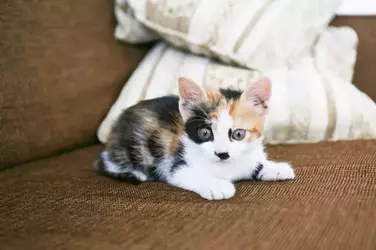Article Archive
A tiny calico cat named Blue has captured hearts online after a viral TikTok video revealed her rare form of feline dwarfism.
Despite being three years old, Blue could easily be mistaken for a kitten due to her unusually small size—a result of a rare genetic condition.
Discovered in a barn as a stray, Blue's unusual appearance and quiet demeanor—she rarely meows—quickly set her apart. Her owner, Morgan Augustine (@morganraugustine), shared a video showcasing Blue's size by placing her next to common household items.
It turns out she is smaller than a Stanley cup, and roughly half the height of the towel holder, amassing 7.6 million views.
"Dwarfism in cats is due to a rare genetic mutation that causes a disproportionate feline body and can lead to serious health problems," veterinary professional Michelle Bernstein told Newsweek.
Signs of feline dwarfism include poor or stunted growth, disproportionately large heads, shortened limbs, abnormal bone structure, enlarged joints, bowed forelimbs, spinal curvature, and facial deformities such as undershot jaws and shortened noses, according to pet food company Purina.
Although Augustine noted that Blue rarely meows, Bernstein said it's unclear whether the condition affects vocal cords. "Typical health problems that they can develop are spinal issues, osteoarthritis, mobility difficulties, obesity, and dental problems," she explained.

A stock image of a calico kitten sitting on the sofa.JordiStock/iStock / Getty Images Plus
Augustine also mentioned Blue has exceeded her life expectancy of six months old. While she is thriving, her condition doesn't come without its challenges.
Purina states the outcomes vary depending on severity and which bones are affected. While some cats adapt well, others may face serious mobility issues and a higher risk of obesity, arthritis, and joint problems.
Maintaining a healthy diet, keeping cats indoors, and providing mental stimulation are key to their well-being. Although dwarf cats may appear especially cute, owners should be mindful of the potential health consequences of selective breeding and be prepared for ongoing care needs.
Newsweek reached out to @morganraugustine for comment via TikTok. We could not verify the details of the case.
But amid the outpouring of affection, some users have expressed concern over the ethical implications of breeding cats like Blue. "I want a dwarf cat, but I don't want to contribute to unethical breeding, so I'll probably settle for loving your dwarf cat," one comment read.
Bernstein echoed these concerns, warning about the rising popularity of "munchkin cats," a nickname often used for cats selectively bred to display dwarfism traits.
"Due to the cat's small size, dwarfism has become popular in society, causing cat breeders to selectively breed them," she said. "I strongly encourage anyone interested in getting a cat to always adopt and never purchase from a breeder—but more importantly, to research more about munchkin cats with dwarfism to understand the harsh reality behind these 'cute small cats.'"
A tiny calico cat named Blue has captured hearts online after a viral TikTok video revealed her rare form of feline dwarfism.
Despite being three years old, Blue could easily be mistaken for a kitten due to her unusually small size—a result of a rare genetic condition.
Discovered in a barn as a stray, Blue's unusual appearance and quiet demeanor—she rarely meows—quickly set her apart. Her owner, Morgan Augustine (@morganraugustine), shared a video showcasing Blue's size by placing her next to common household items.
It turns out she is smaller than a Stanley cup, and roughly half the height of the towel holder, amassing 7.6 million views.
What Is Feline Dwarfism?
"Dwarfism in cats is due to a rare genetic mutation that causes a disproportionate feline body and can lead to serious health problems," veterinary professional Michelle Bernstein told Newsweek.
Signs of feline dwarfism include poor or stunted growth, disproportionately large heads, shortened limbs, abnormal bone structure, enlarged joints, bowed forelimbs, spinal curvature, and facial deformities such as undershot jaws and shortened noses, according to pet food company Purina.
Although Augustine noted that Blue rarely meows, Bernstein said it's unclear whether the condition affects vocal cords. "Typical health problems that they can develop are spinal issues, osteoarthritis, mobility difficulties, obesity, and dental problems," she explained.

A stock image of a calico kitten sitting on the sofa.JordiStock/iStock / Getty Images Plus
Augustine also mentioned Blue has exceeded her life expectancy of six months old. While she is thriving, her condition doesn't come without its challenges.
Purina states the outcomes vary depending on severity and which bones are affected. While some cats adapt well, others may face serious mobility issues and a higher risk of obesity, arthritis, and joint problems.
Maintaining a healthy diet, keeping cats indoors, and providing mental stimulation are key to their well-being. Although dwarf cats may appear especially cute, owners should be mindful of the potential health consequences of selective breeding and be prepared for ongoing care needs.
Newsweek reached out to @morganraugustine for comment via TikTok. We could not verify the details of the case.
Internet Reactions
Social media users have been enamored with Blue's appearance. One viewer commented, "She's so compact," while another wrote, "She's a tiny potato—I'm crying." A third user added, "I'M SOBBING SHE'S SO SMALL AND ROUND."But amid the outpouring of affection, some users have expressed concern over the ethical implications of breeding cats like Blue. "I want a dwarf cat, but I don't want to contribute to unethical breeding, so I'll probably settle for loving your dwarf cat," one comment read.
Bernstein echoed these concerns, warning about the rising popularity of "munchkin cats," a nickname often used for cats selectively bred to display dwarfism traits.
"Due to the cat's small size, dwarfism has become popular in society, causing cat breeders to selectively breed them," she said. "I strongly encourage anyone interested in getting a cat to always adopt and never purchase from a breeder—but more importantly, to research more about munchkin cats with dwarfism to understand the harsh reality behind these 'cute small cats.'"
